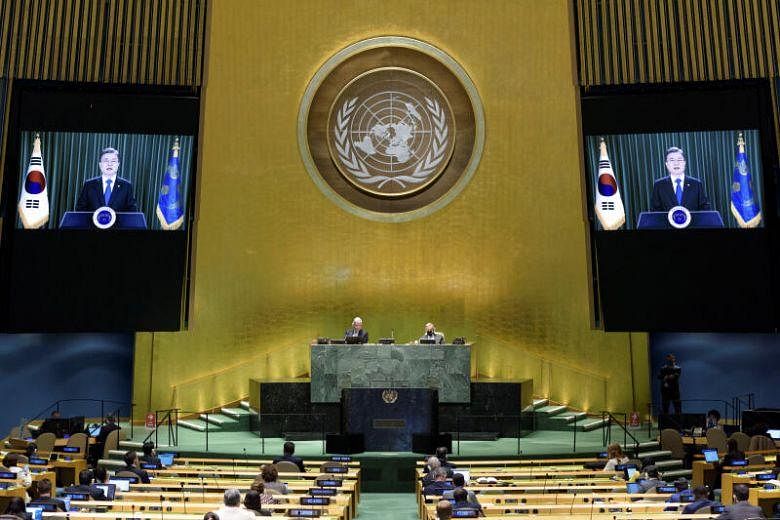SEOUL (THE KOREA HERALD/ASIA NEWS NETWORK) - President Moon Jae-in last week expressed hope that South Korea and the US would work together toward the declaration of a formal end to the 1950-53 Korean War, which ended in an armistice.
In a video speech for the annual gala of the Korea Society, a New York-based private organisation, he said it would "indeed pave the way for peace" on the peninsula and make the Seoul-Washington alliance "even greater."
As noted by critics, his remarks appear to be ill-timed and take little account of the viability of the initiative.
His wish for cooperation with the US in achieving the end-of-war declaration comes at a time when anti-Pyongyang sentiment is worsening here and in the international community following the recent killing of a South Korean civil servant by North Korean troops.
North Korean leader Kim Jong-un offered a rare apology to Moon and South Koreans over the incident.
But Pyongyang has been unresponsive to Seoul's call for a joint inquiry into what exactly happened to the official, who was found north of the inter-Korean sea border on Sept 22 after disappearing from a ship overseeing fishing operations.
Moon called for the declaration of a formal end to the Korean War in his prerecorded address for a UN General Assembly session, which was aired in South Korea shortly after the official was shot to death by the crew on a North Korean patrol boat.
Moon's repeated expression of eagerness to achieve an end-of-war declaration ignored Pyongyang's adherence to its nuclear arms and ballistic missile development programs.
North Korea showed off a new intercontinental ballistic missile - believed to be capable of being tipped with multiple nuclear warheads - and other upgraded weapons during a military parade celebrating the 75th anniversary of the founding of its ruling Workers' Party on Saturday (October 10).
In an address at the start of the predawn event in Pyongyang, Kim vowed to continue to strengthen his regime's "self-defence war deterrence."
Not surprisingly, US officials and pundits remain lukewarm or negative toward Moon's proposal that Seoul and Washington join forces to achieve the declaration of a formal end to the Korean War.
At a webinar in Washington a day after Moon made the proposal, Marc Knapper, US deputy assistant secretary of state for Korea and Japan, said the "pressure campaign (against Pyongyang) will continue" until the recalcitrant regime "responds to the will of the international community" and dismantles its nuclear arsenal.
He noted that inter-Korean relations were inseparable from the denuclearization of the North.
Pyongyang also appears to have little interest in Moon's peace initiative, instead choosing to focus on strengthening its position in negotiations with the next US administration either under incumbent President Donald Trump or Democratic candidate Joe Biden.
Its decision to unveil new weapons during a predawn parade and to refrain from launching a long-range ballistic missile seems to be an attempt to avoid generating further US hostility against the Kim regime ahead of November's presidential election in the US, while maintaining pressure on Washington to ease its stance.
Moon has argued that an end-of-war declaration would provide the security guarantee the North has long sought, thus prompting it to abandon its nuclear ambitions and take the path to a permanent peace regime on the peninsula.
But the declaration would be more likely to embolden Pyongyang to demand the withdrawal of US troops from the South and the lifting of US-led international sanctions against it without taking steps toward denuclearisation.
In responding to such a situation, the South Korea-US alliance might fray, rather than grow stronger.
If Moon is unsure that an end-of-war declaration would be instrumental in eliminating the North's nuclear arsenal, he is unnecessarily endangering the security of South Korea to achieve a symbolic political feat.
What he should now focus on is to clarify details of the killing of the South Korean official and ensure that no such incident happens again.
Few people would agree that pursuing a permanent peace with the North is appropriate when it refuses to conduct a joint probe with the South into the incident.
The Korea Herald is a member of The Straits Times media partner Asia News Network, an alliance of 24 news media organisations.

